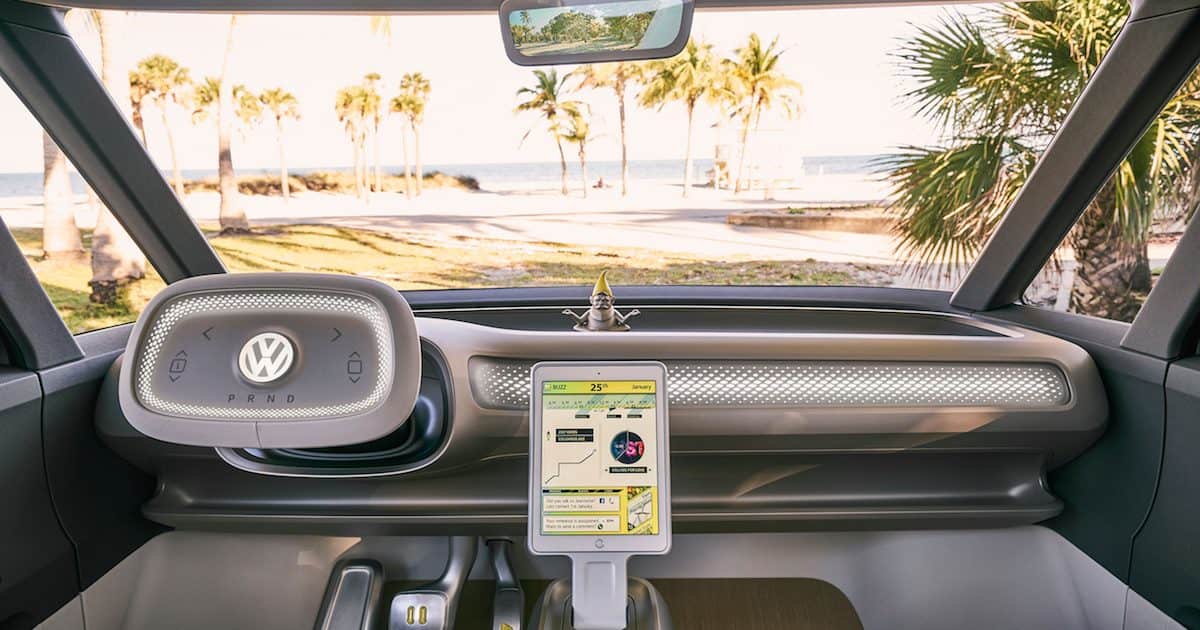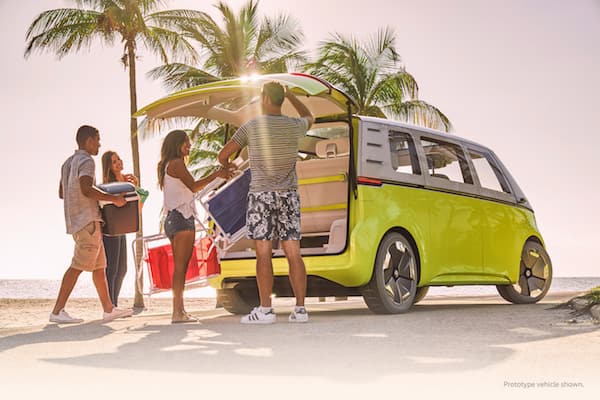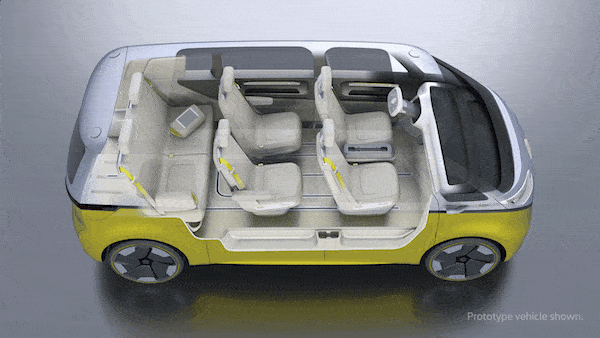I’ve found my next minivan, and it’s German. The Volkswagen Bus is coming back, and it’s going to be better than ever. The design harkens back to the original Type 2 Microbus, but modernized and all-electric. Oh, and did I mention that it looks like the instrument cluster will be replaced by a tablet, perhaps even an iPad?

From Concept to Production, Here Comes the Next Volkswagen Bus
Said to be driven by popular demand, Volkswagen announced the new Bus on October 12. It’s scheduled to enter production and become available in the United States, Europe, and China in 2022. The original concept electric vehicle, the I.D. Buzz, has been an award-winning hit since it was first revealed at the Detroit Auto Show. Volkswagen’s Chairman of the Board of Management, Dr. Herbert Diess, is excited to bring the minivan to the public.
For me, the I.D. Buzz concept is the most beautiful and most exciting electric car in the world. Our goal is clear: we want to make the fully electric, fully connected car a bestseller around the world. The iconic car of the electric age must be a Volkswagen.
As of this writing, there don’t appear to be any all-electric minivans in production, or even in the woks. Chrysler has announced a Pacifica Hybrid, but that minivan won’t be available in an all-electric version. Volkswagen wants to make a fully connected and, more importantly, fully electric minivan a household name. From the concept photos, the new VW Bus will impress in much more than just its drivetrain.
Great Aesthetics, and an Impressive Drivetrain
Speaking of the drivetrain, it’s worth noting that the first VW Bus sold in the United States in 1950 only carried 30 horsepower. By way of contrast, the next-generation Volkswagen Buss will sport a total of 369 horsepower from the electric motors on each axle, with a 111kWh battery pack located in the floor of the chassis. Driving range should be around 300 miles, and a fast-charge system can recharge the battery to 80 percent in 30 minutes, about as much time as it takes a family of four to take a break and stretch their legs.

The original two-tone paint job will be in full effect, but VW’s adding a light strip surrounding the vehicle. That should give the new Bus a very distinctive visual signature at night. The LED headlights have hexagonal segments that act like “eyes” to help communicate the Bus’s status while driving. Inside, you’ll have plenty of space for passengers and cargo, and there’s even a front trunk for more storage.
A Great Interior, With Modern Controls
While VW hasn’t specifically stated this, the instrument cluster appears to have been replaced with a touchscreen interface mounted between the two front seats. That touchscreen, by the way, looks remarkably like an iPad. While we don’t know what Project Titan is up to right now, it’s definitely possible that at least part of that work will go into the VW Bus.

Inside, the VW Bus looks to offer plenty of room for passengers and cargo alike, with seats that move on tracks to customize how you lay out the interior for different needs. The seats fold and collapse, allowing you to create tables, move an entertainment console into place, or even generate more storage room.
The Future of the Volkswagen Bus All-Electric Minivan
We don’t have price points yet for the new VW Bus, but it will hopefully be competitive with hybrids and other minivans. A model of the VW Bus projected to begin delivery in 2025 will even feature an autonomous driving mode, but we know even less about that at this point than we do the 2022 model. For now, I know that the Volkswagen Bus is coming back, and I want one.
Love the new Bus BTW. I think that is just about the time we will need a new one. Our 2003 Eurovan is still plugging along nicely, but some new wheels will be nice by 2022 or 2025.
Sorry… you can call me olde and crotchety, but I will give up my internal combustion engine when they pry it from my cold dead hands. As someone who grew up in the muscle car era, these electric cars lack the muscle and the character of those older cars.
Yea… yea… I’ve seen the videos where a Tesla beats a modern Dodge Hellcat in the quarter mile. But this highlights the only advantage of an electric engine: immediate torque. Extend that to a half-mile and the stock 707 Hp Hellcat beats the Tesla.
Most of these electric cars handle like crap because they are lighter and not meant to be driven like the older cars. Even the old VW Bus, when upgraded to the 1.8 litre VW 4-cylinder engine, had some good push and decent handling. This is because the engine adds weight and lowers the center of gravity. Tesla had to lower the ride height to get the car to handle like a sports car and does well on highway driving. However, get it into a city or a good country road and not only does it handle like it will fly off the road but will constantly bottom out.
Sorry… I like a car with oomph, with feeling, and the roar of the engine. I wish these companies would stop pushing this electric crap until they give me something worth the time. Until then, it’s all pablum!
To each his or her own, Scott. To each his or her own 🙂
I had a ’67 VW Bus in high school. That was a light car and a light engine.
Ultimately it rolled over because of its high center of gravity combined with its inability to make it up hills very well in winter creating a situation where some of the time you would need to back down the hill and make a run at i.
It final time in such a predicament, my Bus couldn’t make it up even a moderate winter hill in snowy conditions so I floored it, but then the accelerator froze to the floor because the ice melt from my boots drizzled onto the pedal and bonded the accelerator to the floor causing the rear wheels to spin out when I inched over the crest of the hill. This sent me sideways into a ditch causing the van to roll over and thus it was dead.
End of an era.
My Bus could have used some more power from an electric motor and the added weight of all of the battery packs.
I’ve seen other articles where it says the seats can slide completely out on the tracks. I hope that is the case. Awesome space for real camper.
In the prototype, I believe the seats can slide completely out. We’ll see what the actual production model carries over from the I.D. Buzz concept vehicle.
I LIKE it.